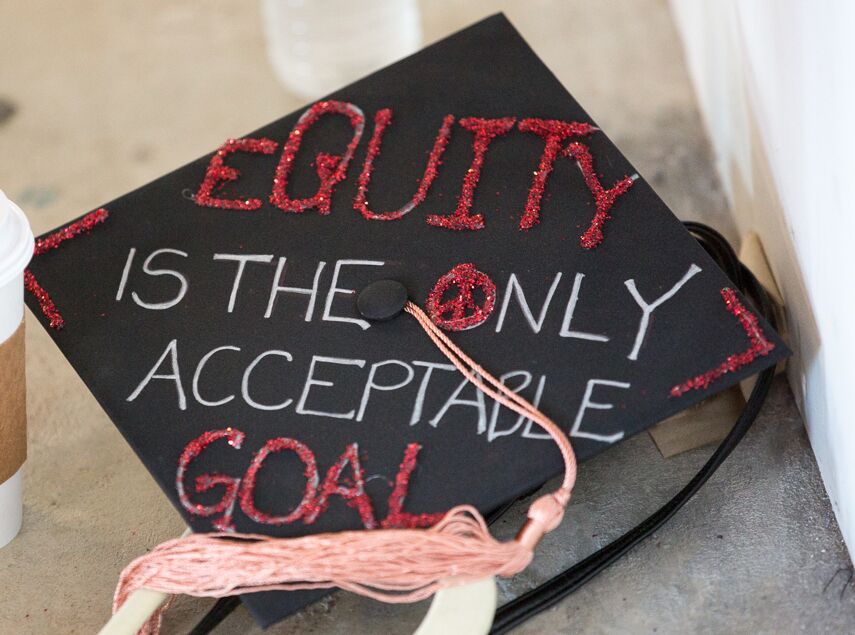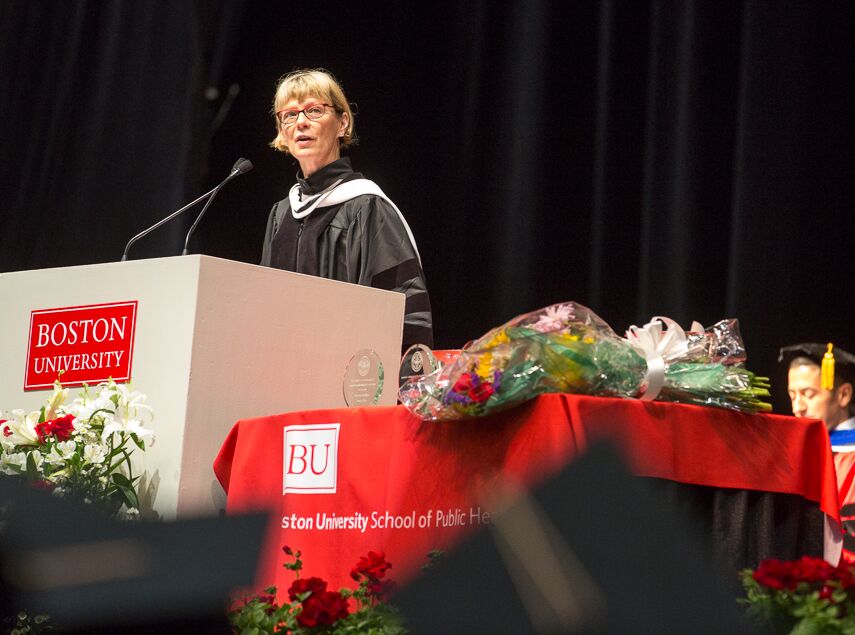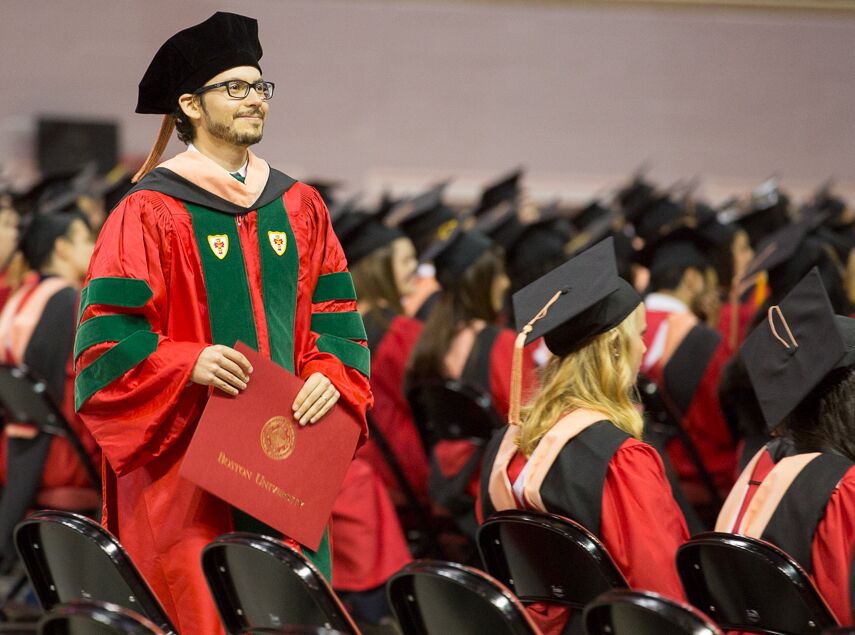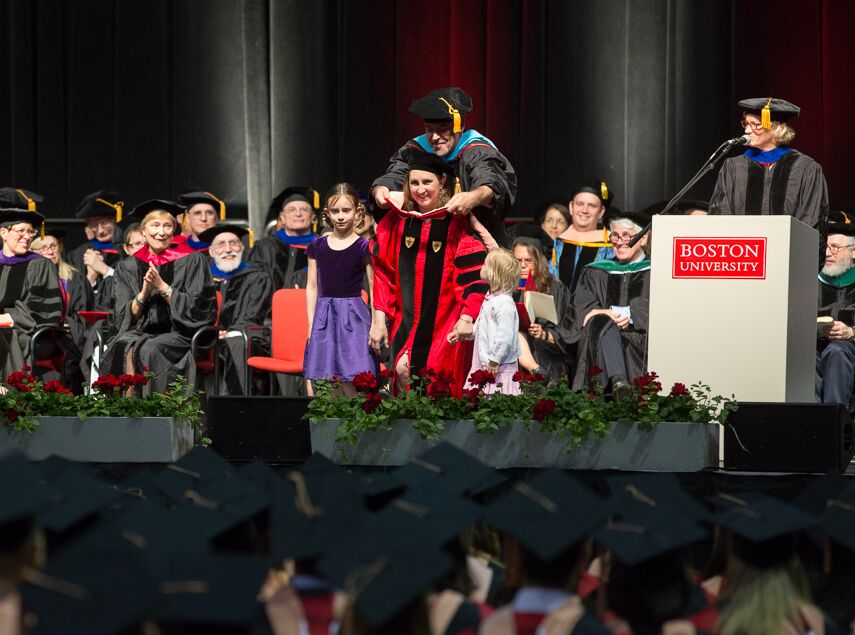MA Health Secretary to SPH Grads: ‘Search for the Positive’.
Massachusetts State Secretary of Health and Human Services Marylou Sudders stressed compassion and perspective to the 281 graduates of the School of Public Health assembled Saturday in Agganis Arena.
“We must never forget that behind every dollar and statistic is a very real person,” said Sudders.
Appointed by Governor Charlie Baker in January 2015, Sudders leads the largest executive agency in state government—a $19.4 billion state budget with 22,000 dedicated public servants—and oversees critical services that touch one in four residents of the Commonwealth.
However, she said, there are still tremendous challenges to health in Massachusetts: “I am humbled that not even with $19 billion is every child safe from harm, that four people die every day in this great Commonwealth from an opioid overdose, that there are profound disparities in health and educational outcomes depending on one’s zip code.”
Sudders said her 15 months as secretary have been dominated by the need to make Medicaid sustainable in Massachusetts. Medicaid is the largest component of the state budget at 40 percent of spending, she said, and has reached a point of “crowding out all the other things that we know are so important to health in our communities: social services, housing, mitigation of homelessness.”
Noting her audience’s understanding of the complexity of conditions that make people healthy, Sudders said that “coverage is only part of the equation. Coverage doesn’t necessary translate into accessibility or affordability. Individuals who are Hispanic, for example, represent 10 percent of the Massachusetts population, and yet are 20 percent of individuals who are uninsured. When we look closer at healthcare status by zip codes, there are glaring disparities.
“Zip codes must not be a predictor of a person’s health status. We must make a pledge in this Commonwealth to eliminate health disparities. We can do it here. This is not just governments’ responsibility. It is our collective responsibility. It is our collective public health responsibility.”
Sudders also emphasized the need for compassion in that work. “Words matter,” she said. “They can be embracing or stigmatizing. I urge caution when you describe populations.
“Nothing can be truer when we think of addictions. What are the images that come to mind when we say ‘addict,’ ‘junkie’?”
Sudders drove the point home with her own experience with stigmatizing language. “I have three generations of family with serious mental illness,” she said, “and it was completely devastating the day my niece with schizoaffective illness was described in a waiting room as ‘the schizoaffective down the hall.’”
Professionally trained as a social worker, Sudders was Massachusetts commissioner of mental health from 1996 to 2003, overseeing the creation of the first children’s mental health commission. “Our collective commitment to health promotion, to disease prevention, must also include the promotion of mental health,” she said. “I applaud this school of public health for its commitment to mental health.”
As important as language, Sudders said, is perspective. “Be positive or search for the positive. I used to caution my social work students, who mastered the art of cataloging person’s or families’ deficits, to find strengths or positives to build from. Every community has a strength if you search. It may be tiny, but it offers hope.”
For almost 10 years, Sudders headed the Massachusetts Society for the Prevention of Cruelty to Children. In 2012, Sudders was appointed as the behavioral health expert to the Commonwealth’s Health Policy Commission (HPC), and she remains on this Commission in her capacity as Secretary. Prior to her appointment as Secretary, Sudders was an associate professor and chair of health and mental health at Boston College’s Graduate School of Social Work.
To the graduates just beginning their careers, Sudders said, “Public service needs you. If not now, perhaps later. Public service is a privilege, it’s about channeling your advocacy into shaping good public policy and programs.
“Your graduate education provides a strong platform for public service. Think about it.”
No matter their avenue or approach, she urged the graduates to “have passion for your field of interest, compassion for the individuals and communities that you are privileged to work with, and commitment to a healthier society locally and globally.”
Student speaker Faiz Kidwai, an MPH recipient committed to equality, equity, and human rights, also urged “radical compassion.”
Kidwai said his family, in emigrating from Pakistan when he was 16, “became poor overnight.” Although his family didn’t have health insurance and lived in subsidized housing, he said, “We were poor, but not that poor, and I wish I could say the same thing for the people who I met at the homeless shelters, emergency rooms, and free health clinics where I volunteered during high school and college.
“Whatever little privilege I had hit me like a ton of bricks, and I realized that the only reason I sat on this side of the table was due to nothing more than good fortune.”
Kidwai urged his fellow graduates to always be aware of their own privilege as they go out to combat the inequalities at the root of health issues from obesity to addiction. “At SPH we have learned about the origins and epidemiology of viruses like Zika and Ebola,” he said, “but perhaps more importantly we have learned the origins and epidemiology of injustice, racism, sexism, and oppression.” The centrality of these issues, Kidwai said, makes public health “a moral enterprise.”
Two faculty members were honored for their teaching and scholarship during the ceremony. Gouri Gupte, an assistant professor of health law, policy & management, received the Norman A. Scotch Award for Excellence in Teaching, and Jonathan Levy, professor and associate chair of environmental health, received the Faculty Career Award in Research and Scholarship.
Dean Sandro Galea also congratulated Christopher Gill, associate professor of global health, who would receive the Metcalf Cup for Excellence in Teaching at the University-wide commencement on May 15. The Metcalf Cup is the highest award Boston University gives to its faculty.
Graduate Jennifer Masdea was awarded the Leonard H. Glantz Award for Academic Excellence, and Amparo “Chary” Ortiz, financial administrator for the Department of Biostatistics, received the Dzidra J. Knecht Staff Award for Distinguished Service.
A total of 497 students graduated with degrees from SPH in the 2015-2016 school year.












